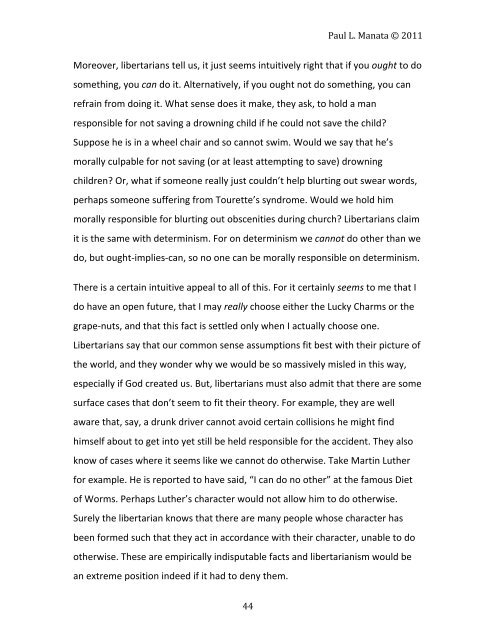Free Will, Moral Responsibility, and Reformed Theology - Analytic ...
Free Will, Moral Responsibility, and Reformed Theology - Analytic ...
Free Will, Moral Responsibility, and Reformed Theology - Analytic ...
You also want an ePaper? Increase the reach of your titles
YUMPU automatically turns print PDFs into web optimized ePapers that Google loves.
44<br />
Paul L. Manata © 2011<br />
Moreover, libertarians tell us, it just seems intuitively right that if you ought to do<br />
something, you can do it. Alternatively, if you ought not do something, you can<br />
refrain from doing it. What sense does it make, they ask, to hold a man<br />
responsible for not saving a drowning child if he could not save the child?<br />
Suppose he is in a wheel chair <strong>and</strong> so cannot swim. Would we say that he’s<br />
morally culpable for not saving (or at least attempting to save) drowning<br />
children? Or, what if someone really just couldn’t help blurting out swear words,<br />
perhaps someone suffering from Tourette’s syndrome. Would we hold him<br />
morally responsible for blurting out obscenities during church? Libertarians claim<br />
it is the same with determinism. For on determinism we cannot do other than we<br />
do, but ought-‐implies-‐can, so no one can be morally responsible on determinism.<br />
There is a certain intuitive appeal to all of this. For it certainly seems to me that I<br />
do have an open future, that I may really choose either the Lucky Charms or the<br />
grape-‐nuts, <strong>and</strong> that this fact is settled only when I actually choose one.<br />
Libertarians say that our common sense assumptions fit best with their picture of<br />
the world, <strong>and</strong> they wonder why we would be so massively misled in this way,<br />
especially if God created us. But, libertarians must also admit that there are some<br />
surface cases that don’t seem to fit their theory. For example, they are well<br />
aware that, say, a drunk driver cannot avoid certain collisions he might find<br />
himself about to get into yet still be held responsible for the accident. They also<br />
know of cases where it seems like we cannot do otherwise. Take Martin Luther<br />
for example. He is reported to have said, “I can do no other” at the famous Diet<br />
of Worms. Perhaps Luther’s character would not allow him to do otherwise.<br />
Surely the libertarian knows that there are many people whose character has<br />
been formed such that they act in accordance with their character, unable to do<br />
otherwise. These are empirically indisputable facts <strong>and</strong> libertarianism would be<br />
an extreme position indeed if it had to deny them.


